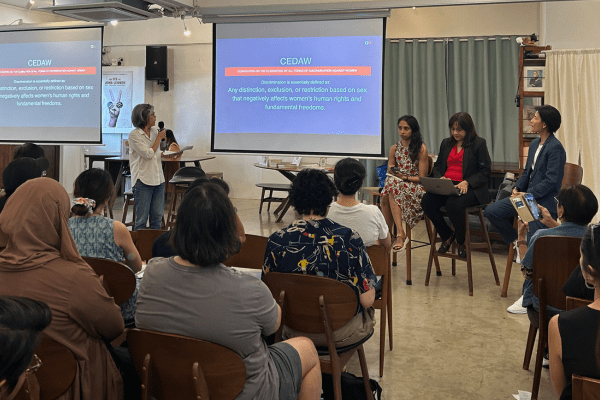-
Advocacy Theme
-
Tags
- Abortion
- Adoption
- Caregiving
- CEDAW
- Disability
- Domestic Violence
- Domestic Workers
- Harassment
- Healthcare
- Housing
- International/Regional Work
- Maintenance
- Media
- Migrant Spouses
- Migrant Workers
- Muslim Law
- National budget
- Parental Leave
- Parenthood
- Polygamy
- Population
- Race and religion
- Sexual Violence
- Sexuality Education
- Single Parents
- Social Support
- Sterilisation
- Women's Charter
Advancing Women’s Rights in Singapore: A Post-CEDAW Event Recap
July 24th, 2024 | Events, LGBTQ, Migration and Trafficking, Muslim Women's Rights, News, Workplace Harassment
On July 20, 2024, five non-governmental organisations (NGOs) and ground-up initiatives collaborated to host an event titled “Advancing Women’s Rights in Singapore” to share insights and recommendations from Singapore’s participation in the 88th CEDAW Committee session.
Held at room2f, the event brought together over 70 attendees, including other local NGOs, their members and supporters.
Key Findings from the CEDAW Process
AWARE’s Executive Director, Corinna Lim, provided an overview of the United Nations’ Convention on the Elimination of All Forms of Discrimination Against Women (CEDAW), and its role in promoting women’s rights globally.
She highlighted the significance of the CEDAW Committee’s review process as a platform for NGOs to raise crucial issues affecting women in Singapore.
A panel of representatives from various NGOs presented key findings from their shadow reports submitted to the CEDAW Committee. You can also watch each NGO’s address to the CEDAW committee below.
AWARE: Sugidha Nithiananthan, Director of Advocacy, Research and Communications, focused on issues affecting single, unmarried mothers, migrant spouses, and gender-based violence.
She emphasised the need for equal access to housing and child-related benefits for unwed mothers, redefining the concept of family, and removing the notion of illegitimacy.
For migrant spouses, AWARE called for independent long-term visit passes in cases of abuse, and clearer residency criteria.
AWARE also advocated for expanding the definition of online harm, including financial violence, and comprehensive sexuality education.
Watch Corinna Lim’s CEDAW Committee address
Beyond the Hijab: Saza Faradilla highlighted inequalities in rights for Muslim women, particularly in areas of polygamy, divorce, and inheritance.
She called for making polygamy illegal, aligning divorce rights with civil law, and ensuring equal inheritance rights.
Saza also emphasised the importance of allowing Muslim women to choose between civil and Sharia courts for various legal matters.
Watch Saza Faradilla’s CEDAW Committee address
End-Female Genital Cutting Singapore: Rabby’a Hanna presented findings on the prevalence of female genital cutting (FGC) among Muslim girls and women, revealing that nearly 75% had been cut.
She noted the lack of standardisation and monitoring in the practice, which is not taught in medical schools.
The group called for raising awareness, eliminating the practice, ensuring adequate healthcare for survivors, implementing legal measures, and collecting data on the prevalence of FGC.
Watch Rabby’a Hanna’s CEDAW Committee address
Humanitarian Organisation for Migration Economics (HOME): Jaya Anil Kumar, Senior Manager (Research and Advocacy), addressed the challenges faced by migrant domestic workers (MDWs).
She discussed the employer-tied system, limited job mobility, gender-specific work requirements, medical surveillance, and restrictions on marriage to locals.
HOME advocated for inclusion under the Employment Act and Work Injury Compensation Act, and emphasised the need for continuous rest days and education pathways for MDWs.
Watch Jaya Anil Kumar’s CEDAW Committee address
Sayoni: Anne Goh from Sayoni emphasised the importance of abolishing censorship in media and education and ensuring equality in employment, labour rights, health, and family law.
She shared videos of the CEDAW Committee’s interventions and highlighted Sayoni’s evidence-based advocacy and community-informed research approach.
Watch Anne Goh’s CEDAW Committee address
Sayoni will be hosting a community panel specifically for LBTI women on 17 August 2024. Follow their socials for more details soon.
The afternoon concluded with a panel discussion where participants addressed questions from the audience.
The insights shared reaffirmed the commitment to addressing the challenges faced by women in Singapore, and outlined the path forward for advancing women’s rights.
Key points from the audience discussion included:
- The need for more regular dialogue between NGOs and the government
- Encouraging attendees to share what they learned at the event and inform others about the current gaps Singapore is facing in women’s rights
- Ways the public can continue to support NGOs working in this area (volunteer, share on social media, donate), and acknowledging that achieving change takes time
The event was a great example of the collective strength of NGOs united in their pursuit of gender equality, and the panellists underscored the necessity of sustained engagement with the government and the importance of individual advocacy in driving change.








